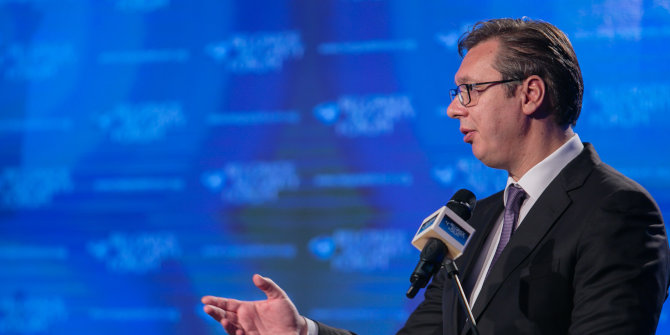 Several countries in the Western Balkans have responded to the Covid-19 outbreak with draconian measures that entail a further erosion of democracy, writes Natasha Wunsch. She argues the pandemic is shining a spotlight on the impact of geopolitical competition in the Western Balkans, where authoritarian forces are undermining the EU’s democracy promotion efforts.
Several countries in the Western Balkans have responded to the Covid-19 outbreak with draconian measures that entail a further erosion of democracy, writes Natasha Wunsch. She argues the pandemic is shining a spotlight on the impact of geopolitical competition in the Western Balkans, where authoritarian forces are undermining the EU’s democracy promotion efforts.
The Western Balkans are facing dire economic and social consequences related to the Covid-19 outbreak, with the region’s weakened economies, underdeveloped healthcare systems and tense state-society relations struggling to cope with the consequences of extended lockdowns even as case numbers remain low. Yet it is the political impact of the Covid-19 crisis that is of greatest concern.
For the region’s authoritarian-minded leaders, the pandemic has offered a convenient pretext to silence critics and further consolidate their hold on power. The EU’s delayed response has favoured a reorientation towards alternative international partners – Russia and China – who are less interested in seeing democratic progress. Overall, the current situation has dealt a further blow to the prospect of EU enlargement, illustrating the challenges the EU faces in remaining a credible and effective player in its neighbourhood.
Deepening authoritarianism and threats to democracy
Western Balkan leaders moved swiftly to seize upon the Covid-19 pandemic as an opportunity to further expand executive powers. Echoing Viktor Orbán’s ‘coronavirus coup,’ Serbian President Vučić – against constitutional prerogatives – declared an open-ended state of emergency. This includes prohibiting further meetings of parliament that would contravene lockdown rules, while army patrols in the street enforce strict and ever-changing lockdown measures.

Aleksandar Vučić, President of Serbia, Credit: BSF/Aleksandar Andjic (CC BY-NC-ND 2.0)
Scheduled elections were suspended in both Serbia and North Macedonia, albeit under rather different circumstances. More generally, the regional response to the pandemic has exposed the mutual distrust between citizens and their governments. There has been an emphasis on restrictive measures and repression, including hefty fines and even detention, rather than transparent communication and education over effective measures to prevent any further spread of the virus.
In Montenegro, the government has been publishing the full names and addresses of persons in self-isolation, violating the right to privacy. Kosovo became the first case in which a sitting government was toppled over disagreements related to the pandemic response. Prime Minister Kurti lost a no-confidence vote less than two months after taking office over his refusal to endorse President Thaci’s call to declare a state of emergency. The move exposed a rift in US and EU strategies regarding the normalisation of relations between Kosovo and Serbia, including allegations that the US envoy was directly involved in orchestrating Kurti’s fall. By removing one of its main opponents, there is now a risk that an agreement including a land swap may be pushed through without sufficient democratic legitimacy, thus threatening regional stability.
Geopolitical drift towards authoritarian partners
Besides deepening trends of democratic backsliding in the region, the Covid-19 pandemic has also precipitated geopolitical shifts. While Russia has been a long-term contender for regional influence in the Balkans, China has been steadily increasing its economic presence in the region in recent years, with a particular focus on Serbia.
From an emerging rival to the EU, the coronavirus crisis has turned China into a preferred alternative for some of the region’s leaders. President Vučić pointedly dismissed EU solidarity as a ‘fairy tale,’ praising instead his country’s ‘steel friendship’ with the People’s Republic as he personally welcomed a plane carrying protective equipment in provenance from China at Belgrade airport. Pedalling pro-China propaganda further, the government-friendly tabloid Informer posted billboards stating ‘Thank you, brother Xi’ across Serbia’s capital.
These symbolic actions stand in contrast to the substantive amounts of EU funding provided to the Western Balkans for direct support to health care systems as well as broader post-pandemic economic and social recovery, totalling over €400 million for the entire region. Yet amidst growing uncertainty about the prospect of EU accession, Western Balkans citizens, especially in Serbia, have become increasingly wary of endless accession negotiations and more open to alternative external influences.
The end of EU enlargement?
There was hope that this year would finally bring some positive dynamics back to the EU enlargement process, which has seen stagnation and relative neglect over the past decade. After a lack of progress at the European Council in October 2019, the European Commission developed a new enlargement methodology that addressed some of the shortcomings of EU conditionality in the face of pervasive state capture.
In the midst of the Covid-19 pandemic, the member states endorsed the opening of membership negotiations with Albania and North Macedonia at a virtual summit in late March. Yet what under normal circumstances would have been hailed as a major step forward barely made any headlines.
Ultimately, the Western Balkans’ response to the Covid-19 crisis has made two things painfully obvious. First, that the EU enlargement process has failed to act as a stability anchor for the region. As the credibility of the accession perspective has dwindled, so too has the EU’s ability to push for positive political change in the region.
Second, and perhaps more worryingly still, the rise of alternative, authoritarian-minded powers has provided a more generalised counterweight to the EU’s democracy promotion efforts. In Central and Eastern Europe, the EU’s democratic conditionality tended to go hand in hand with a broader dynamic of democratic diffusion. In contrast, the EU’s efforts to promote democracy in the Western Balkans occur in a much more mixed international environment.
Beyond the direct impact of the Covid-19 crisis, the countervailing force of authoritarian powers may be the best explanation for the uneven success of the EU’s democracy promotion efforts in the Western Balkans.
Please read our comments policy before commenting.
Note: This article gives the views of the author, not the position of EUROPP – European Politics and Policy or the London School of Economics.
_________________________________
 Natasha Wunsch – Sciences Po Paris / ETH Zurich
Natasha Wunsch – Sciences Po Paris / ETH Zurich
Natasha Wunsch is Assistant Professor of Political Science/European Integration at Sciences Po Paris and Senior Researcher with the European Politics Group at ETH Zurich, as well as a member of the Balkans in Europe Policy Advisory Group (BiEPAG). She has published a book on EU Enlargement and Civil Society in the Western Balkans.





